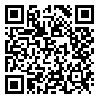1- Ph.D. student of Higher Education Management, Department of Education, Sar. C., Islamic Azad University, Sari, Iran
2- Associate Professor, Department of Educational Management, Sar. C., Islamic Azad University, Sari, Iran. ,enayati@iau.ac.ir
3- Assistant Professor, Department of Educational management, Sar. C., Islamic Azad University, Sari, Iran.
2- Associate Professor, Department of Educational Management, Sar. C., Islamic Azad University, Sari, Iran. ,
3- Assistant Professor, Department of Educational management, Sar. C., Islamic Azad University, Sari, Iran.
Abstract: (368 Views)
Objective: This study aimed to develop a model of employees' soft skills with a digital human capital development approach at Farhangian University of Mazandaran, Iran in 2022.
Methods: This study was applied in terms of purpose and adopted a mixed method with an exploratory approach. The statistical population of the qualitative study consisted of experts in the field of education, psychology, management, and technology who were selected purposefully, and finally, due to the saturation method, 15 experts were selected as a sample. The statistical population in the quantitative phase included 173 participants selected by stratified random sampling. The research data collection tool in the qualitative phase was a semi-structured interview whereas, in the quantitative section, a researcher-made questionnaire was extracted from interviews. Data in the qualitative phase were analyzed using the thematic analysis, and in the quantitative phase, confirmatory factor analysis, divergent and convergent validity were used. The face, content, and construct validity of the instrument were confirmed. Their composite reliability and Cronbach's alpha were calculated above 0.70, which was approved.
Results: The qualitative phase of this study identified five main dimensions: soft communication skills, functional skills, organizational skills, technology-related skills, and research and development in the digital domain. These dimensions encompassed 16 sub-components, including effective communication skills, decision-making in digital environments, technology evaluation, and participation in digital projects. In the quantitative phase, the validity of the research model was confirmed using structural equation modeling (SEM). Additionally, the analysis results indicated that performance evaluation and digital organizational processes had the highest impact, while decision-making and problem-solving in the digital domain were the most influenced and held the highest priority among the components. These findings highlighted the critical importance of analytical, decision-making, and management skills in the development of digital human capital.
Conclusion: The results of this study can provide valuable insights for policymakers at Farhangian University in designing training programs to enhance faculty and staff's digital soft skills.
Methods: This study was applied in terms of purpose and adopted a mixed method with an exploratory approach. The statistical population of the qualitative study consisted of experts in the field of education, psychology, management, and technology who were selected purposefully, and finally, due to the saturation method, 15 experts were selected as a sample. The statistical population in the quantitative phase included 173 participants selected by stratified random sampling. The research data collection tool in the qualitative phase was a semi-structured interview whereas, in the quantitative section, a researcher-made questionnaire was extracted from interviews. Data in the qualitative phase were analyzed using the thematic analysis, and in the quantitative phase, confirmatory factor analysis, divergent and convergent validity were used. The face, content, and construct validity of the instrument were confirmed. Their composite reliability and Cronbach's alpha were calculated above 0.70, which was approved.
Results: The qualitative phase of this study identified five main dimensions: soft communication skills, functional skills, organizational skills, technology-related skills, and research and development in the digital domain. These dimensions encompassed 16 sub-components, including effective communication skills, decision-making in digital environments, technology evaluation, and participation in digital projects. In the quantitative phase, the validity of the research model was confirmed using structural equation modeling (SEM). Additionally, the analysis results indicated that performance evaluation and digital organizational processes had the highest impact, while decision-making and problem-solving in the digital domain were the most influenced and held the highest priority among the components. These findings highlighted the critical importance of analytical, decision-making, and management skills in the development of digital human capital.
Conclusion: The results of this study can provide valuable insights for policymakers at Farhangian University in designing training programs to enhance faculty and staff's digital soft skills.
Send email to the article author
| Rights and permissions | |
 |
This work is licensed under the Creative Commons - Attribution 4.0 International. |






